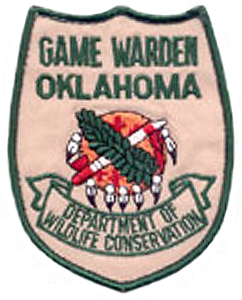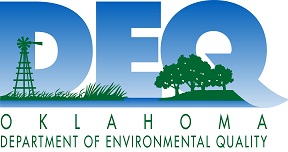
The Oklahoma Turnpike Authority is an agency of Oklahoma that deals with issues regarding the Oklahoma turnpike system. Along with the Oklahoma Department of Transportation, the Authority is the primary infrastructure construction and maintenance agency of the State.

The Oklahoma Department of Transportation (ODOT) is an agency of the government of Oklahoma responsible for the construction and maintenance of the state's transportation infrastructure. Under the leadership of the Oklahoma secretary of transportation and ODOT executive director, the department maintains public infrastructure that includes highways and state-owned railroads and administers programs for county roads, city streets, public transit, passenger rail, waterways and active transportation. Along with the Oklahoma Turnpike Authority, the department is the primary infrastructure construction and maintenance agency of the State.

The government of the U.S. State of Oklahoma, established by the Oklahoma Constitution, is a republican democracy modeled after the federal government of the United States. The state government has three branches: the executive, legislative, and judicial. Through a system of separation of powers or "checks and balances," each of these branches has some authority to act on its own, some authority to regulate the other two branches, and has some of its own authority, in turn, regulated by the other branches.
The California Department of Conservation is a department within the government of California, belonging to the California Natural Resources Agency. With a team of scientists, engineers, environmental experts, and other specialists, the Department of Conservation administers a variety of programs vital to California's public safety, environment and economy. The department's mission is to manage California's working lands. It regulates oil, natural gas and geothermal wells; studies and maps earthquakes and other geologic phenomena; maps and classifies areas containing mineral deposits; ensures reclamation of land used for mining; and administers agricultural and open-space land conservation programs. A division within the department dedicated to encouraging beverage container recycling has been moved into the newly created Department of Resources Recovery and Recycling (CalRecycle). Despite the similar name, the Department of Conservation should not be confused with the California Conservation Corps, another department within the Natural Resources Agency, which provides work experience for young adults. The Department of Conservation often collaborates with its federal equivalents, such as the U.S. Geological Survey.

The Oklahoma Corporation Commission is the public utilities commission of the U.S state of Oklahoma run by three statewide elected commissioners. Authorized to employ more than 400 employees, it regulates oil and gas drilling, utilities and telephone companies.

The Oklahoma Department of Agriculture, Food, and Forestry is a department of the government of Oklahoma under the Oklahoma Secretary of Agriculture. It is responsible for providing services and expertise that promote and protect Oklahoma's food supply and natural resources while stimulating economic growth.

The Oklahoma State Bureau of Investigation (OSBI) is an independent state law enforcement agency of the government of Oklahoma. The OSBI assists the county sheriff offices and city police departments of the state, and is the primary investigative agency of the state government. OSBI works independent of the Oklahoma Department of Public Safety to investigate criminal law violations within the state at the request of statutory authorized requesters. The OSBI was created in 1925 during the term of Governor Martin E. Trapp.

The Oklahoma Department of Wildlife Conservation is an agency of the state of Oklahoma responsible for managing and protecting Oklahoma's wildlife population and their habitats. The Department is under the control of the Wildlife Conservation Commission, an 8-member board appointed by the Governor of Oklahoma with the approval of the Oklahoma Senate. All members serve eight-year terms. The Commission, in turn, appoints a Director to serve as the chief administrative officer of the Department.

The Oklahoma Office of Juvenile Affairs (OJA) is an agency of the state of Oklahoma headquartered in Oklahoma City that is responsible for planning and coordinating statewide juvenile justice and delinquency prevention services. OJA is also responsible for operating juvenile correctional facilities in the State.
The Energy Resources Conservation Board (ERCB) was an independent, quasi-judicial agency of the Government of Alberta. It regulated the safe, responsible, and efficient development of Alberta's energy resources: oil, natural gas, oil sands, coal, and pipelines. Led by eight Board members, the ERCB's team of engineers, geologists, technicians, economists, and other professionals served Albertans from thirteen locations across the province.

The Oklahoma Department of Environmental Quality (DEQ) is a department of the government of Oklahoma under the Governor of Oklahoma. It is responsible for protecting human health and for safeguarding the natural environment: air, water, and land. DEQ is chiefly responsible for the environmental policy of Oklahoma. It is governed by a thirteen member Environmental Quality Board appointed by the Governor, which in turn appoints an Executive Director to administer the Department.

The Oklahoma Water Resources Board (OWRB) is an agency in the government of Oklahoma under the Governor of Oklahoma. OWRB is responsible for managing and protection the water resources of Oklahoma as well as for planning for the state's long-range water needs. The Board is composed of nine members appointed by the Governor with the consent of the Oklahoma Senate. The Board, in turn, appoints an Executive Director to administer the agency.

The Oklahoma State Banking Department (OSBD) is an agency of the state of Oklahoma. The Banking Department is responsible for regulating Oklahoma's banking system, including state-chartered banks, credit unions, savings and loan associations, and trust companies, as well as [(money transmitters)] and money order companies. The department also handles consumer complaints involving state-regulated financial institutions.

The Oklahoma Conservation Commission is an agency of the government of Oklahoma under the Governor of Oklahoma. It is the duty of the Commission to conserve Oklahoma's land and water. The Commission is also responsible for upstream flood control protection, a state-funded conservation cost-share program, reclamation of abandoned mine land and non point source water quality monitoring, planning, and management, in addition to a variety of educational and informational activities.
Carl Michael "Mike" Smith is an American businessman, energy expert, and politician from Oklahoma. Smith is currently serving as the executive director of the Interstate Oil and Gas Compact Commission. Smith has served in numerous energy policy positions for both the United States federal and Oklahoma state governments, including Assistant Secretary of Energy for Fossil Energy under President George W. Bush (2002–2004) and Oklahoma Secretary of Energy under Governor of Oklahoma Frank Keating (1995–2002).

The Mines and Geo-sciences Bureau (MGB) is a government agency of the Philippines under the Department of Environment and Natural Resources (DENR). The MGB is responsible for the conservation, management, development and use of the country's mineral resources, including those in reservations and public lands.

The Oklahoma Secretary of Energy is a member of the Oklahoma Governor's Cabinet. The Secretary is appointed by the Governor, with the consent of the Oklahoma Senate, to serve at the pleasure of the Governor. The Secretary serves as the chief advisor to the Governor on energy policy development and implementation.

The New Mexico Energy, Minerals and Natural Resources Department (EMNRD) is a state agency in New Mexico tasked with managing and protecting the natural and energy resources of New Mexico.

The Alberta Energy Regulator (AER) is a quasi-judicial, independent agency regulating the development of energy resources in Alberta. Headquartered in Calgary, Alberta, the AER's mandate under the Responsible Energy Development Act (REDA) is "to provide for the efficient, safe, orderly and environmentally responsible development of energy resources and mineral resources in Alberta.”
The Wyoming Department of Environmental Quality (DEQ) founded in 1973, is a Wyoming state agency to protect, conserve and enhance the environment of Wyoming "through a combination of monitoring, permitting, inspection, enforcement and restoration/remediation activities". It consists of 6 divisions and since 1992, the Environmental Quality Council (EQC), a separate operating agency of 7 governor-appointed members.














